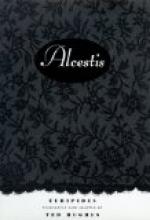[He goes with ALCESTIS into the house.]
CHORUS.
There be many shapes of mystery;
And many things God brings to be,
Past hope or fear.
And the end men looked for cometh not,
And a path is there where no man thought.
So hath it fallen here.
NOTES
P. 3, Prologue. Asclepios (Latin Aesculapius), son of Apollo, the hero-physician, by his miraculous skill healed the dead. This transgressed the divine law, so Zeus slew him. (The particular dead man raised by him was Hippolytus, who came to life in Italy under the name of Virbius, and was worshipped with Artemis at Aricia.) Apollo in revenge, not presuming to attack Zeus himself, killed the Cyclopes, and was punished by being exiled from heaven and made servant to a mortal. There are several such stories of gods made servants to human beings.
P. 3, l. 12, Beguiling.]—See Preface. In the original story he made them drunk with wine. (Aesch. Eumenides, 728.) As the allusion would doubtless be clear to the Greek audience, I have added a mention of wine which is not in the Greek. Libations to the Elder Gods, such as the Fates and Eumenides, had to be “wineless.” Historically this probably means that the worship dates from a time before wine was used in Greece.
P. 4, l. 22, The stain of death must not come nigh My radiance.]—Compare Artemis in the last scene of the Hippolytus. The presence of a dead body would be a pollution to Apollo, though that of Thanatos (Death) himself seems not to be so. It is rather Thanatos who is dazzled and blinded by Apollo, like an owl or bat in the sunlight.
P. 5, l. 43, Rob me of my second prey.]—“You first cheated me of Admetus, and now you cheat me of his substitute.”
P. 6, l. 59, The rich would buy, etc.]—Here and throughout this difficult little dialogue I follow the readings of my own text in the Bibliotheca Oxoniensis.
P. 7, l. 74, To lay upon her hair my sword.]—As the sacrificing priest cut off a lock of hair from the victim’s head before the actual sacrifice.
P. 8, l. 77, Chorus.]—The Chorus consists of citizens, probably Elders, of the city of Pherae. Dr. Verrall has rightly pointed out that there is some general dissatisfaction in the town at Admetus’s behaviour (l. 210 ff.). These citizens come to mourn with Admetus out of old friendship, though they do not altogether defend him.
The Chorus is very drastically broken up into so many separate persons conversing with one another; the treatment in the Rhesus is similar but even bolder. See Rhesus, pp. 28-31, 37-42. Cf. also the entrance-choruses of the Trojan Women (pp. 19-23) and the Medea (pp. 10-13); and ll. 872 ff., 889 ff., pp. 50, 51, below.
Instead of assigning the various lines definitely to First, Second, Third Citizen, and so on, I have put a “paragraphus” (—), the ancient Greek sign for indicating a new speaker.




